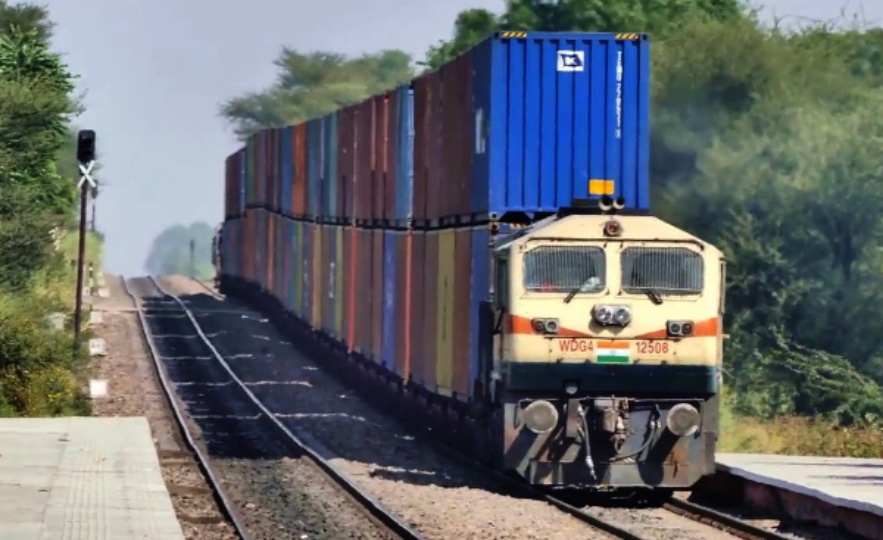
Railway freight transport : On track to a greener tomorrow
NEW DELHI : The focus is on sustainability as government and business leaders convene in Davos for the World Economic Forum’s annual meeting. With 95% of the world’s transport energy still coming from fossil fuels, the transport sector is responsible for approximately one-quarter of greenhouse gas emissions. In a world increasingly concerned about climate change and the environment, choosing sustainable options for transport can make a significant difference.
Railways are one of the most fuel-efficient ways to move freight over land. One freight train can replace hundreds of trucks running on highways and emitting greenhouse gases. Using railways instead of trucks to move freight helps reduce GHG (greenhouse gas) emissions by up to 75%. A study showed that rail emitted approximately 0.0149 kg. of GHG per ton-km. of freight moved, whereas for trucks, the emissions are around ten times higher at 0.1445 kg. of GHG per ton-km. of freight moved. This is the lowest emissions per ton-km. of any mode typically used to move freight. The use of rail also reduces the economic toll of congestion on roads and repairs and maintenance of highways.
A single freight train can carry one thousand to five thousand tonnes of freight. The use of diesel fuel to power the freight train, while not optimal, still generates only 25% to 33% of the GHG emissions produced by trucks. [4] And as railways transit to use electric locomotives or other non-fossil fuels in the future, this will bring many more benefits to battling climate change.
In this context, Indian Railways today offers an eco-friendly, efficient, and compelling alternative to shifting freight by road. Indian Railways today has a share of around 28% in India’s freight movement.
This is a significant number, but there is potential for more. The National Rail Plan (NRP) 2020 aims to increase the share of freight traffic to 44% by 2051.
The Railway Ministry is also taking steps to encourage industries to use rail for freight and the movement of goods and commodities. Dedicated Freight Corridors (DFCs) have been constructed on important highdensity routes to make freight operation efficient with higher throughput per wagon and train, the running of heavy haul trains, lower energy consumption with reduced operation and maintenance costs, and a reduction in transit time with a lower cost of transportation.
And the Corporates have been taking advantage of this. An example is Adani Wilmar, one of the largest Food & FMCG companies in India has been transporting edible oils via railways as part of their commitment to help reduce carbon emissions. This commitment was recognized with the Indian Railways awarding an Appreciation Letter to Adani Wilmar for being the largest transporter of edible oils via rail during the financial year 2022–23. Since 1st April, 2022, the company has been awarded 44,354 Rail Green Points (RGPs) till date. With each Rail Green Point equivalent to a tonne of CO2 reduction, the metric reflects the 44,354 metric tonnes of carbon emissions saved by Adani Wilmar choosing rail over road transport. The company has been constantly putting efforts into increasing the volume through railway rakes and adding more containers in 2023 compared to last year. Notably, Rail Green Points are not financially tradeable like carbon credits; they inspire a corporate ethos that holds environmental considerations over monetary gain.
The Rail Green Points will promote and encourage industries to utilize railway transport for cargo movement and support their efforts in adopting sustainable supply chain management practices. This in turn will help industries not only reduce their carbon footprint but also contribute to a larger narrative of sustainable corporate practices in India.
In a country like India, where economic growth and environmental sustainability must coexist, the railways offer a practical, efficient, and environmentally friendly solution with a win-win situation for both the economy and the planet. Beyond business efficiency and environmental protection, the use of railways for freight also represents a broader societal shift towards recognizing the importance of sustainable practices that value the health of our planet as much as economic prosperity.
With the continuing focus on improving the railway freight transport system through incentive schemes and enhanced connectivity for seamless integration with other modes of transport, the potential for reducing carbon emissions, decreasing road congestion, and improving overall logistical efficiency is immense. With the support of corporates like Adani Wilmar who have set a precedent and demonstrated the successful use of rail for freight, the Indian Railway will be able to substantially contribute to India’s efforts for a greener and more sustainable future.
